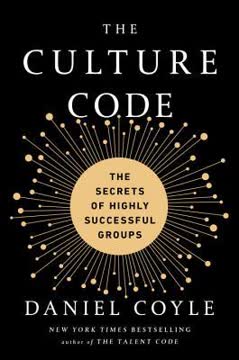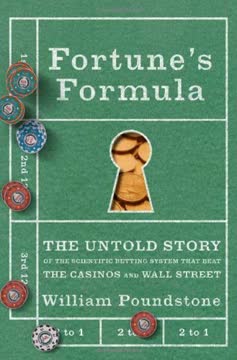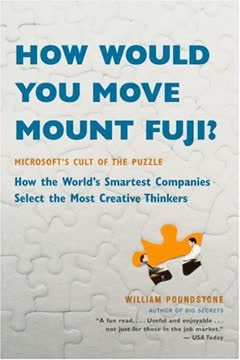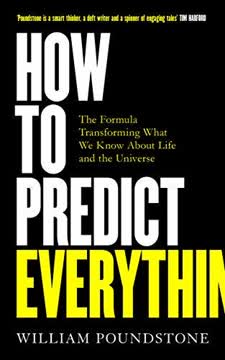Key Takeaways
1. Humans Struggle with Randomness, Creating Predictable Patterns
All of us are constantly trying to predict the actions of others, while reserving some unpredictability for ourselves.
Inherent Predictability. Humans find it nearly impossible to behave unpredictably, especially in simple matters. This limitation stems from unconscious patterns influenced by training, emotions, and short memories. These patterns make human choices, even when intended to be random, susceptible to prediction.
Randomness Experiments. Studies show that when asked to generate random sequences, people tend to over-alternate between choices and avoid repetitions, creating patterns that deviate significantly from true randomness. This phenomenon is evident in various contexts, from generating digit sequences to playing games like rock, paper, scissors.
Implications for Outguessing. The predictability in human behavior provides a foundation for outguessing strategies. By recognizing these unconscious patterns, one can anticipate choices in various scenarios, including games, tests, and even financial decisions. The key lies in understanding that humans are more "mechanical" than they perceive themselves to be.
2. Exploit Predictable Irrationality in Games of Chance
The strategy for playing RPS depends on how skilled your opponent is.
Rock, Paper, Scissors Strategy. In rock, paper, scissors (RPS), novice players often favor rock, while women are more likely to throw scissors. Naive players also tend to avoid repeating the same throw more than twice in a row. These tendencies can be exploited to gain an advantage.
Advanced RPS Tactics. Expert RPS players use pattern recognition, emotional cues, and even trash talk to influence their opponents. Some plan their opening moves and adapt based on whether they win, lose, or tie. The goal is to anticipate the opponent's strategy and counter it effectively.
Poe's Purloined Letter. Edgar Allan Poe's detective, C. Auguste Dupin, solves crimes by understanding that people are predictable when trying not to be. This principle applies to RPS, where players often fall into predictable patterns despite their attempts to be random.
3. Multiple-Choice Tests Reveal Predictable Design Flaws
Test makers try to make it hard for someone who doesn’t know the material to guess the correct answers.
True-False Patterns. True-false tests often contain more "true" answers than "false" ones, and the sequence of correct answers tends to over-alternate. This information can be used to improve guessing accuracy.
Multiple-Choice Tendencies. In multiple-choice tests, the second answer (B) is often the correct choice in four-option questions, while the last answer (E) is favored in five-option questions. Additionally, "none of the above" and "all of the above" answers are disproportionately likely to be correct.
Strategic Guessing. By avoiding the previous correct choice and eliminating options based on clues within the question, test-takers can significantly improve their odds of guessing correctly. These strategies exploit the unconscious patterns of test makers.
4. Lottery Number Choices Reflect Human Bias, Not Randomness
State lotteries became successful only after New Jersey copied an idea from organized crime—letting bettors pick their own numbers.
Unpopular Numbers. Lottery bettors tend to avoid numbers ending in 0, 8, or 9, as well as those containing the "lucky" number 7. They also favor smaller digits and numbers that could be dates.
Ziemba's Research. William Ziemba found that the ten least played numbers in a standard pick-six lottery are 40, 39, 20, 30, 41, 38, 42, 46, 29, and 49. These numbers are about 15 to 30 percent less popular than average.
Contrarian Strategy. By selecting unpopular numbers, lottery players can increase their chances of winning a larger share of the jackpot. However, the odds of winning remain extremely low, and the strategy is primarily for those who enjoy playing the lottery as entertainment.
5. Anticipate Opponents' Moves in Sports by Recognizing Patterns
When you’re receiving, expect the serve to alternate.
Tennis Serve Patterns. Tennis players often over-alternate their serves, making it possible to anticipate the direction of the next serve. A serve to the right is more likely to be followed by a serve to the left.
Randomization Techniques. To avoid predictability, servers can use a heart-rate monitor or watch to generate random choices. The even or oddness of the last digit can determine the direction or type of serve.
Baseball and Football Strategies. In baseball, pitchers tend to over-alternate their pitches, making it possible for batters to anticipate the next pitch. In football, teams are more likely to switch between running and passing plays after an unsuccessful play.
6. Financial Data Often Contains Predictable Anomalies
The random, the arbitrary, and the made-up are all around us and sometimes take on great importance.
Benford's Law. Benford's Law states that in many real-life sets of numerical data, the leading digit is likely to be small. For example, about 30% of numbers start with 1, while only 4.6% start with 9. This law can be used to detect fraud.
Fabricated Numbers. People who make up numbers often unconsciously repeat themselves and favor certain digits. They also tend to avoid round numbers and create patterns that deviate from Benford's Law.
Applications in Fraud Detection. Digit analysis can be used to authenticate expenses, sales figures, tax returns, and election results. By recognizing the idiosyncrasies of invented numbers, investigators can identify potential fraud.
7. The Hot Hand Fallacy Distorts Perceptions of Performance
The semi- is the hardest part of that idea to accept.
The Hot Hand Illusion. The hot hand theory is the belief that a player who has made several successful shots in a row is more likely to make the next shot. However, research has shown that this belief is often an illusion.
Randomness Misconception. People tend to see patterns in random sequences, leading them to believe in the hot hand even when it doesn't exist. They also underestimate the likelihood of streaks in random data.
Implications for Decision Making. The hot hand fallacy can lead to poor decisions in sports, investments, and other areas. It's important to recognize that performance is often more random than it appears.
8. Crowd-Sourced Ratings Reflect Biases and Can Be Outguessed
We are all currently engaged in a Zenith experiment, and the stakes are our privacy, our wealth, and our very identities.
The Number 7 Bias. People asked to think of a number between 1 and 10 most often pick 7. This bias can distort crowd-sourced ratings, causing them to peak at around 7 out of 10.
Scale Limit Significance. Ratings at or near the scale limits (e.g., 0-star or 5-star) carry the most conviction. These ratings are more likely to reflect genuine opinions and experiences.
Implications for Decision Making. When evaluating crowd-sourced ratings, pay particular attention to the proportion of lowest and highest ratings. These extremes provide more valuable information than the average score.
9. Password Creation is Limited by Predictable Human Choices
The computer user believes that she has utter freedom to choose a password.
Common Password Patterns. Many people use easily guessable passwords, such as "password," "123456," and "qwerty." They also tend to follow predictable patterns when adding numbers, punctuation marks, and capitalization.
Mangled Passwords. Even prudent users favor the same patterns of obfuscation, such as adding "123" onto the end or alternating capitals and lowercase letters. This reduces the range of potential options and makes passwords easier to crack.
Creating Strong Passwords. To create a secure password, use a random string of characters. You can also convert a phrase or sentence to a password, but avoid using famous quotes.
10. Outguessing Requires Understanding Both Psychology and Statistics
The random, the arbitrary, and the made-up are all around us and sometimes take on great importance.
Combining Disciplines. Outguessing involves understanding both the psychology of human behavior and the statistics of random events. By combining these disciplines, one can develop effective strategies for predicting and influencing outcomes.
Applications in Various Fields. The principles of outguessing can be applied to a wide range of fields, including sports, finance, marketing, and security. The key is to recognize the predictable patterns in human choices and exploit them to one's advantage.
Ethical Considerations. While outguessing can be a powerful tool, it's important to use it ethically and responsibly. The goal should be to improve decision-making and create positive outcomes, not to manipulate or deceive others.
Last updated:
FAQ
1. What is Rock Breaks Scissors by William Poundstone about?
- Explores Predictable Irrationality: The book examines how humans are predictably irrational, especially when trying to act randomly or unpredictably, and how these patterns can be exploited.
- Wide-Ranging Applications: Poundstone applies these insights to games, tests, sports, finance, and everyday decisions, showing how unconscious patterns influence choices.
- Focus on Outguessing: The central theme is learning to outguess and outwit others by recognizing and leveraging the predictability in human behavior.
- Grounded in Psychology and Statistics: The book combines psychological experiments, statistical analysis, and real-world examples to illustrate its points.
2. Why should I read Rock Breaks Scissors by William Poundstone?
- Reveals Cognitive Biases: The book uncovers deep-seated biases like the hot hand illusion and gambler’s fallacy, helping readers avoid common decision-making errors.
- Practical, Actionable Advice: Poundstone offers strategies for outguessing others in scenarios like office pools, sports betting, and fraud detection, making the book useful beyond theory.
- Improves Critical Thinking: By understanding how randomness and prediction work, readers can make smarter choices in investing, gaming, and daily life.
- Empowers with Knowledge: The book equips readers to recognize and counteract manipulation, both by others and by their own flawed intuitions.
3. What are the key takeaways from Rock Breaks Scissors by William Poundstone?
- Humans Misinterpret Randomness: We are hardwired to see patterns and streaks in random data, leading to illusions like the hot hand and gambler’s fallacy.
- Predictability is Everywhere: Even when trying to be random, people fall into unconscious patterns that can be anticipated and exploited.
- Awareness Leads to Better Choices: Recognizing these biases and patterns allows individuals to outguess others and make more rational decisions.
- Wide Applicability: The principles apply to games, tests, sports, finance, cybersecurity, and everyday interactions, making the book both practical and insightful.
4. What is the "outguessing machine" described in Rock Breaks Scissors and why is it important?
- Historical Invention: The outguessing machine, first built at Bell Labs, was designed to predict human choices in games like matching pennies, based on the idea that humans are poor at being truly random.
- Claude Shannon’s Contribution: Shannon improved the machine, showing it could predict human choices about 65% of the time by analyzing patterns in previous moves.
- Symbolic of Predictability: The machine exemplifies the book’s thesis that even simple algorithms can exploit human predictability, effectively "reading minds."
- Foundation for Strategies: This concept underpins many of the book’s practical outguessing strategies in games and real-life scenarios.
5. How does Rock Breaks Scissors by William Poundstone explain why humans struggle to generate true randomness?
- Psychological Experiments: Studies like Chapanis’s 1952 experiment show that people avoid repeating digits and favor certain sequences, making their "random" choices predictable.
- Common Patterns: People tend to over-alternate, avoid streaks, and unconsciously repeat certain patterns, undermining their attempts at randomness.
- Implications for Outguessing: This inability to be truly random is the basis for many of the book’s strategies, from games to password creation.
- Predictable Biases: These biases are consistent and can be systematically exploited by those who recognize them.
6. What is the "hot hand" theory and how does Rock Breaks Scissors address it?
- Definition and Popularity: The hot hand is the belief that success in a sequence (like making several basketball shots in a row) increases the likelihood of continued success.
- Research Findings: Studies by Gilovich, Vallone, and Tversky found no statistical evidence for the hot hand in basketball; streaks are no longer than expected by chance.
- Cognitive Illusion: The belief in the hot hand is rooted in human misunderstanding of randomness and the tendency to see patterns where none exist.
- Nuances and Exceptions: Some sports, like bowling or certain tournaments, may show real streakiness due to their scoring systems, but most "hot hands" are illusions.
7. How does Rock Breaks Scissors by William Poundstone explain common human misunderstandings of randomness?
- Misconception of Random Sequences: People expect random sequences to alternate more than they actually do, leading to the false perception of patterns or streaks.
- Law of Small Numbers: We wrongly expect small samples to reflect the properties of large populations, causing us to overinterpret streaks or clusters.
- Representativeness Heuristic: People judge probabilities by how representative an event seems, not by actual statistical likelihood, leading to errors like the gambler’s fallacy.
- Impact on Decision-Making: These misunderstandings affect choices in gambling, investing, and everyday life.
8. What practical strategies does Rock Breaks Scissors by William Poundstone offer for outguessing in games like rock, paper, scissors?
- Opening Move Advice: Against novices, choose paper first, as rock is the most common opening throw, especially among men.
- Psychological Tactics: Announcing your throw before playing can mislead opponents into avoiding that choice, increasing your odds.
- Pattern Recognition: Good players avoid repeats and switch after losses; anticipating these tendencies can give you an edge.
- Exploiting Predictability: Recognizing and exploiting unconscious patterns in opponents’ choices is key to winning more often.
9. How can readers use Rock Breaks Scissors by William Poundstone to outguess multiple-choice tests and lotteries?
- Multiple-Choice Tests: True answers are more common than false in true-false tests, and certain answer positions (like B or E) are disproportionately correct in multiple-choice formats.
- Avoiding Repetition: Correct answers rarely repeat consecutively; avoiding the previous question’s correct answer can improve guessing odds.
- Special Options: “None of the above” and “all of the above” are often correct, making them good guesses when unsure.
- Lottery Strategies: Choosing unpopular numbers doesn’t improve your odds of winning but can increase your expected payout by reducing the chance of splitting the jackpot.
10. What advice does Rock Breaks Scissors by William Poundstone give for outguessing in sports and office pools?
- Basketball Bracket Pools: Use bracket apps to maximize points, then pick underdogs that are underbet by others to increase your chances.
- Football Pools: The "Evil Twin" strategy—placing two opposite bets—reduces ties and exploits clustering in random picks.
- Oscar Pools: Rely on prediction markets for favorites, but include a few contrarian underdog picks to minimize ties and maximize winning chances.
- Sports Play Patterns: In tennis, baseball, and football, players and teams tend to over-alternate choices after failures, which can be anticipated for a small advantage.
11. How does Rock Breaks Scissors by William Poundstone help detect fraudulent numbers and financial manipulation?
- Benford’s Law: Real-world numbers follow a predictable distribution of leading digits; deviations can indicate fabricated data.
- Digit Patterns: Fraudsters often underuse repeated digits and overuse descending digit pairs, which can be unconscious giveaways.
- Threshold Manipulation: Manipulated numbers often cluster just above psychologically significant thresholds, such as monthly returns just over 1%.
- Practical Detection: Examining digit patterns and requesting more precise figures can help reveal inconsistencies in financial data.
12. What does Rock Breaks Scissors by William Poundstone recommend for improving password security and outguessing Big Data-driven retail strategies?
- Password Pitfalls: Most people choose predictable passwords or follow common mangling patterns, making them vulnerable to cracking.
- Random Passwords: Use truly random character strings, possibly generated by sites like random.org, and convert them into memorable nonsense phrases.
- Password Management: Memorize one strong password for important accounts and use simpler, unique passwords for less critical sites; avoid reusing passwords.
- Retail and Big Data: Retailers use data to nudge customers toward profitable choices; being aware of these tactics (like staged discounts or confusing options) can help consumers negotiate better deals and avoid manipulation.
Review Summary
Rock Breaks Scissors offers practical strategies for outguessing others in various situations, from games to investments. Readers appreciate the blend of psychology, statistics, and real-world applications, finding it informative and entertaining. Some criticize the book's repetitiveness and dense mathematical content, while others praise its insights into human behavior and decision-making. The book's broad coverage of topics means not all chapters appeal equally to every reader. Overall, reviewers find it an interesting read that provides useful tips for improving one's odds in everyday scenarios.
Similar Books










Download PDF
Download EPUB
.epub digital book format is ideal for reading ebooks on phones, tablets, and e-readers.










